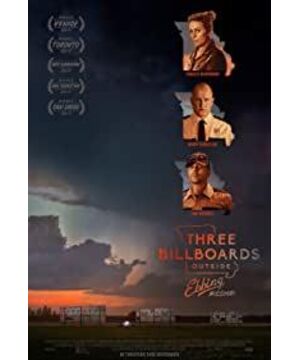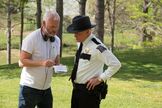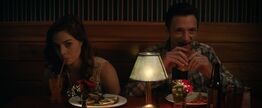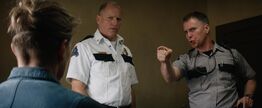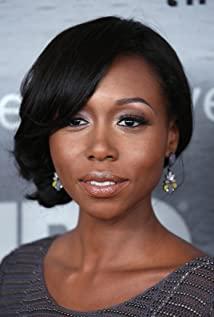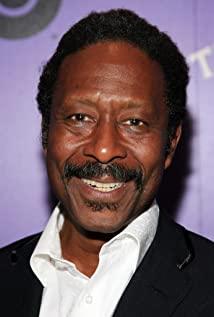Mildred Hayes leaned against the window and neatly negotiated three billboards by the side of the road with advertiser Reid. With a slight push of his index finger, he helped the struggling beetle on the windowsill turn over. . Please keep this detail in your mind and you will find that this woman is not as violent as you see it.
If I hadn't read the director's resume, I would have almost forgotten his stunning debut film "The Killer Has No Holidays". The final scene of the film is so dramatic that it can be incorporated into textbooks as a model of "Three Uniforms". It's no surprise that before becoming a filmmaker, Martin Macdonald was a playwright at the Royal Theatre for many years, and he also won the reputation of "most promising playwright". After entering the industry, although the output is not high, it is steady and steady, the director and screenwriter are shoulder to shoulder, the three works are all wonderful, and the major awards and nominations have been harvested a lot. It can be seen that the expert's evaluation of it - one of the directors who can tell the story of people best - is really appropriate.
"Three Billboards" has a distinct Martin MacDonald style. Martin is originally from Ireland, and often uses Irish folk rhyme in his works. The BGM "Last Rose of Summer" at the beginning of the film is an old Irish folk song, which Beethoven revised himself. Looking at its lyrics "When the sincere heart has withered and the loved one has passed away, who would like to stay alone in this desolate world?", it can be said that the tone of the film has been established from the first note. Three broken billboards stood alone on the side of the road, looking like they were about to be blown down by the wind. Also messy in the wind is the heroine Mildred Hayes, who endured the pain of her daughter's tragic death, as if it were the last rose that bloomed and withered alone.
Mildred is played by Francis McDormand, AKA "Cohen's Wife", this role is tailor-made for her by the director. It is said that Francis, who is nearly 60 years old, felt that he was not suitable to play the role of the mother of teenage children when he first received the invitation, but more suitable to play the role of grandmother. When he was struggling, unexpectedly, her husband Joel Cohen said, "Shut up, the director thinks you are suitable for the role of mother, you can act it!", the sister-in-law really accepted the admonition and obeyed her orders.
Speaking of the Coen brothers, there are some similarities between the film and the Coen brothers' work, such as the setting of the story, dark humor and violent aesthetics. The Coen brothers often set events in relatively closed towns (such as "Frozen", "The Absentee", etc.), and this environment is bound to form a special cultural atmosphere, creating a group of special characters who regularly bound by life. The same is true of "Three Billboards", a fictional town in Missouri, where birds don't poop, and people look up and down. But the director had another intention in placing the location in Missouri. In 2014, a black youth in the state was shot and killed by a white police officer, causing a national sensation, and the words and deeds of Officer Dixon in the film also reflected this phenomenon to some extent. If you watch the film carefully, you can find that Martin Macdonald has skillfully weave social texts such as violent crime, homosexuality, race relations, police enforcement, and even ideology into the story, which is not obtrusive, but also full of fun.
See black humor again. Black humor can be roughly summed up as: in an absurd and unreasonable world, despair of life and death has spawned a mocking attitude towards death. It is shown in Mildred that the truth has not been found out for more than half a year after her daughter's death, so she can only break with this world, and set up three billboards to remind the police not to forget their duties. The sense of absurdity arises spontaneously. In Dixon, it is another manifestation. He has racism and Oedipus tendencies. He likes to read comics and listen to music with headphones. He is indifferent even when the police station is surrounded by fire. Characters that are incompatible with others. From an aesthetic point of view, black humor has a function of judging ugliness, which helps the audience to have a god-like perspective and a sense of alienation. When we feel that these characters can never be ourselves, we will judge and revise our self-worth in the depths of our hearts.
Violence matches this aesthetically dark humor. "Three Billboards" and "Manchester by the Sea" are both mourning films, but the difference is that the latter is despairing, while this film is extremely angry. There is a term in the theater industry called "face-to-face drama", which means that it is infinitely approaching, so that the audience has no escape. Martin McDonnell was a theatre star who naturally brought it to the movies, and Mildred was his violent spearhead. In her world, finding the murderer of her daughter is the only purpose in life. So she always showed off the watch's fighting power, tearing apart in minutes, people blocked the murder, Buddha blocked the Buddha, and the sheriff, the dentist, and the priest were all defeated by her. Listen to her conversation with Sheriff Willoughby, "In my case, I'll build a database. Every baby boy is born with a record, and when he commits a crime, cross-reference is made, and after 100% confirmation of a match Just kill him." It's no longer human. At the same time, the progress of the film is almost a series of violence in which you sing and I appear, and it is not until Mildred burns the police station that the turning point is reached.
However, Martin's violent aesthetics are not the same as those of directors who purely exaggerate violence. It is closely related to human nature, humanism, and characterization. In Mildred's case, her daughter's unsolved case was a factor in why she was like a powder keg that could explode at any moment, but her family life was a mess long before that. Look at this former family of four, the father is used to domestic violence and is still looking for a mistress outside; the mother is an alcoholic; the daughter is drugged, and the mother is called "Bitch"; the elder brother calls his sister "Cunt". There is an impressive scene in the film. Mildred's ex-husband came to persuade her to stop, and after a few words, the ex-husband immediately overturned the table, grabbed Mildred's neck and pressed it to the corner, and his son immediately picked up a knife. on Dad's throat. The "smoothness" and the "quickness" of the three people's actions in this series must have been "practiced" many times. Imagine what kind of situation such a family environment will push a person into?
But we can also see another side of Mildred. Remember the beetle at the beginning of this article? This kind of paragraph belongs to the idle writing outside the main line of the story, but it has a bit of eye-catching meaning. It also includes the dialogue between her and the deer she met and the pair of velvet slippers on her feet. Especially in the part with the little deer, she looked up and saw a little deer standing in front of her while she was serving flowers and plants under the billboard, so she started to talk to it and asked if it was the reincarnation of her daughter, and she said sadly. Come and cry alone, let us see the soft part hidden under her strong madness, and also provide the internal reason for her transformation in the latter part of the film.
The same characterization is seen in Sheriff Willoughby and Dixon. They are also hostile, the difference is that the former is tormented and troubled by the advanced stage of cancer, while the latter is more of a personality factor. But they also have a bright spot. Willoughby paid Mildred the billboard renewal fee before he died. On the one hand, it was a joke, on the other hand, he really hoped that the mother would get what she wanted. Leave two letters to her and Dixon, earnestly reassuring them to eliminate the violence in their hearts. And although Sam Rockwell ranks behind Woody Harrelson in the movie's promotion, his Dixon is more of a male protagonist than Willoughby in the overall structure of the film. He is irritable and irritable, but he is also extremely loyal to the sheriff. After reading the letter left by the sheriff and the kindness he received from Reid, an advertiser who had been hurt by him when he was hospitalized, the kindness in his heart was also inspired. came out.
There is a saying in this film that "anger will only lead to greater anger", which can be regarded as the theme set by the director for the film. In "Three Billboards", we can clearly see that although Martin MacDonald uses violence as the main narrative element, violence is not the purpose, and he deeply reflects on violence: what causes violence ? Is violence against violence the only way to solve the problem? Is private punishment legal? Anger and violence can also backfire on themselves, causing regret and hurt.
Looking at the whole film, the exquisite structure, the smooth rhythm, the interlocking character designs, and the interlocking narrative dynamics are truly admirable. The balance of narrative power has always penetrated into the necessity of punishing evil and the rational boundary of violence. It is this point that creates the film's beautiful, powerful and extraordinary ending. The climax of the narrative and the climax of the connotation have achieved a perfect coincidence. Mildred and Dixon hit the road with guns, ready to go to Idaho to punish the murderer. This is not a climax, but it is still a continuation of the violence and private law enforcement that the two have been showing before. But the next moment, on the way, Mildred asked, "Are you sure you want to do this?" Dixon replied, "Not sure. What about you?" "Me too, I think we can think as we go." When Mildred When De answered in this way, the film came to its highest point, and the two characters also completed the sublimation. The music sounded, and the two showed a relaxed smile in the car, and they reached communication and understanding with each other. This epiphany-like revelation made people extremely comfortable. We know that tracing the culprit is no longer the ultimate goal of "Three Billboards".
♑
View more about Three Billboards Outside Ebbing, Missouri reviews


